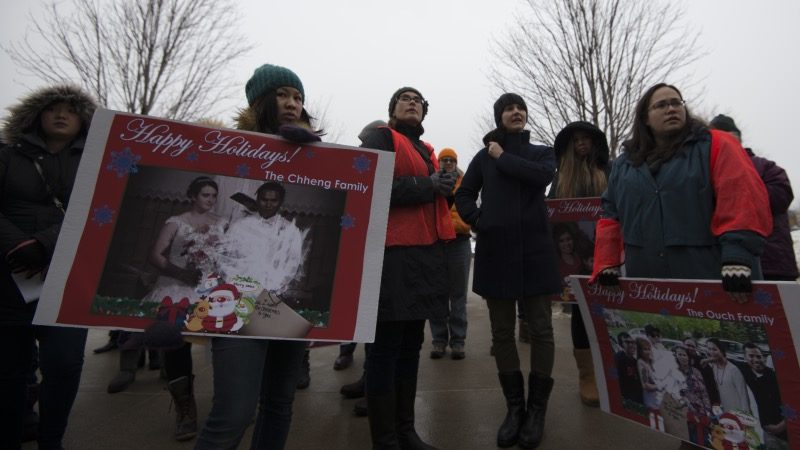A Cambodian man scheduled to be deported from the U.S. this week is a new father who may not get the chance to meet his first child or say goodbye to his wife in person before being sent to a country he has never seen.
Soeun Chheng, 36, is one of eight Cambodians expected to be expelled within days under a 2002 agreement between the U.S. and Cambodia that allows for the deportation of Cambodian residents of the U.S. who have been convicted of a felony.

“His name is on the list,” Allison Chheng, his wife, said in a Facebook message on Sunday from her home in the U.S. state of Minnesota.
Convicted as a teenager in a fatal shooting, Mr. Chheng served more than 17 years in prison. Out of jail since 2012, he married in August and was detained by immigration authorities just days after the couple learned they had conceived their son. The child was born on Thursday.
“He was not there for any of my pregnancy [and] has not met the baby,” Ms. Chheng, 23, said.
Her husband has no family in Cambodia, she said.
“Where will he go. Who is going to help him,” she said. “What will he do to support himself. Where will he live.”
The couple married just a few weeks before Mr. Chheng, whom everyone calls “Posy,” was detained during a routine check by U.S. Immigration and Customs Enforcement (ICE) over the crime he committed at 14, she said.
Mr. Chheng is one of eight Minnesota men who have been at the center of a monthslong campaign by family members and advocates aimed at halting their deportations.
Four of the “Minnesota 8” were deported in March, one was released from immigration detention in February and three others, including Mr. Chheng, remain in ICE detention while they attempt to have their removal orders halted by an immigration judge.
For months, Cambodian officials have repeatedly expressed the government’s desire to revise the repatriation agreement with the U.S., including making deportations “voluntary.”
On Thursday, Prime Minister Hun Sen called the deportation of Cambodians from the U.S. and their division from family there “a sad separation.”
“We are asking to amend the agreement for humanitarian and human rights reasons,” Mr. Hun Sen said in a speech, two days after Foreign Affairs Ministry and U.S. State Department officials discussed the issue during a closed-door meeting in Phnom Penh.
“When they send back the [former] prisoners to Cambodia, the wives and children continue living in the United States,” he said. “This is a sad separation.”
Last Tuesday, a U.S. Embassy spokesman said that the U.S. had “no updates” on “the status of the repatriation agreement.”
Thirteen Cambodians have been deported from the U.S. under the agreement this year, adding to more than 500 who have been deported since 2002, according to the NGO Returnee Integration Support Center (RISC). Mr. Chheng’s story is similar to those of many Cambodians who have been deported.
He was born in a Thai refugee camp, immigrated to the U.S. at age 4 and has never been to Cambodia, Ms. Chheng said.
He and his family were resettled into what was then a poverty-stricken and crime-ridden neighborhood on the south side of St. Paul, according to a statement from the Southeast Asia Resource Action Center (Searac) released last month.
“He was bullied as a young boy and fell into the wrong crowd,” the statement says.
At 14, when Mr. Chheng was charged with the felony, he “was the youngest person in the history of Ramsey County ever to be tried and convicted as an adult,” according to Searac. After serving his sentence and being released on probation in 2012, he had been working full-time at a local barber shop and staying out of trouble.
Bill Herod, a RISC adviser who has worked with deportees for more than a decade, said the difficulties faced by Cambodians who face deportation from the U.S. were often the result of “shortcomings in the U.S. refugee resettlement process.”
“If they became involved with gangs or drugs or petty crime in order to survive poverty and violence, that is the responsibility of the people of the U.S., certainly not the people of Cambodia,” Mr. Herod said in an email last week.
For Mr. Chheng’s family in Minnesota, his pending deportation and detention has already had an impact. Ms. Chheng said she had moved from a house in Willmar, Minnesota, to an apartment in Cottonwood, Minnesota, where most of her family lives.
“I moved into a one-bedroom, income-based apartment, and as a result, have to drive an hour to work,” she said in the Searac statement.
Since Mr. Chheng’s detention by ICE, Ms. Chheng said this week that she had spent about $1,000 to file court documents and $2,000 more on telephone calls in order to speak with her husband while he’s in detention.
Mr. Chheng was almost deported in March, but secured an emergency stay of removal after his lawyer filed a motion to reopen his immigration case, which was denied last week, according to Ms. Chheng.
She said his attorney would try to file a new stay on Monday.
“We are going to work on fighting to try and bring my husband back to be with his family,” she said. “We need him here.”
(Additional reporting by Kuch Naren)